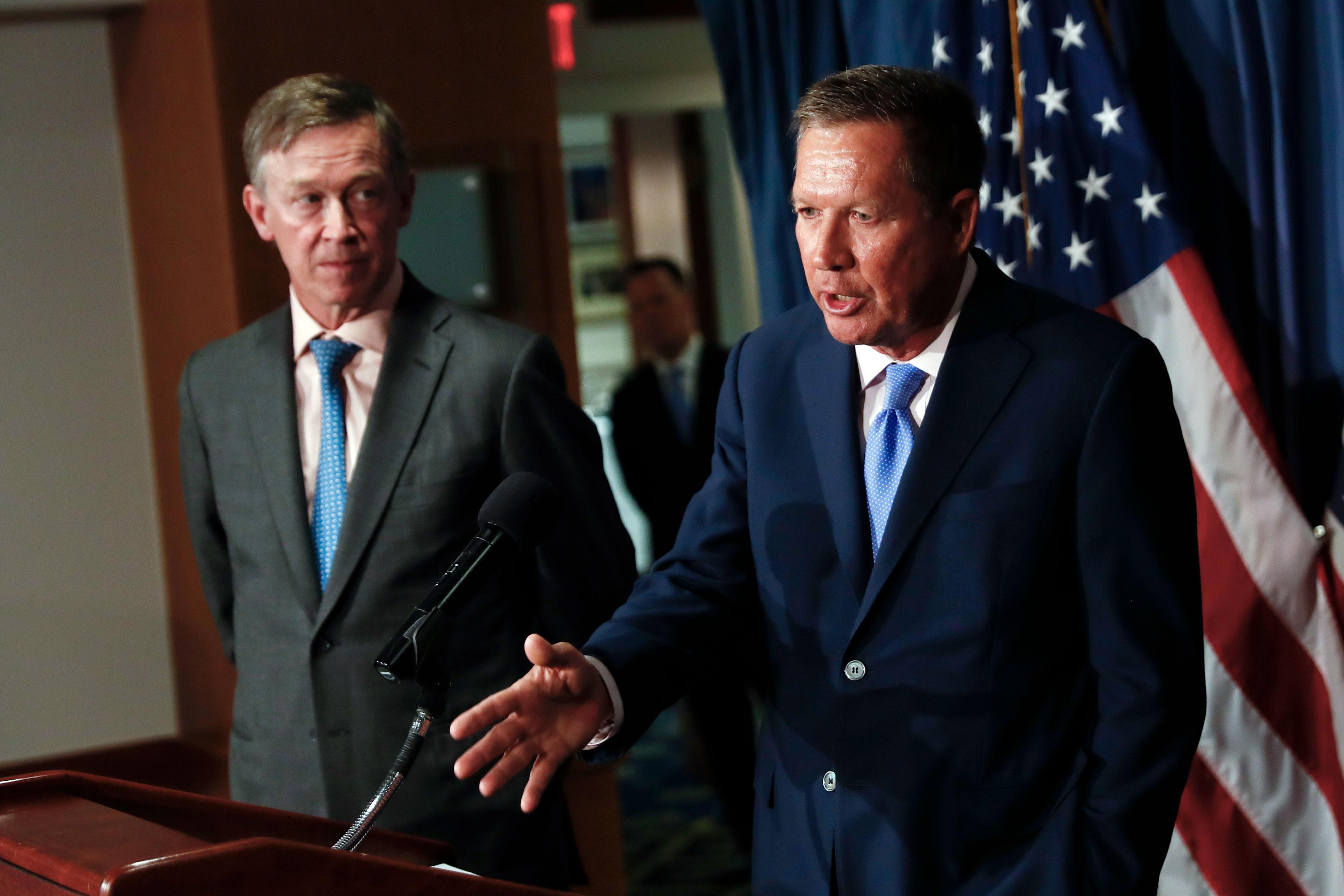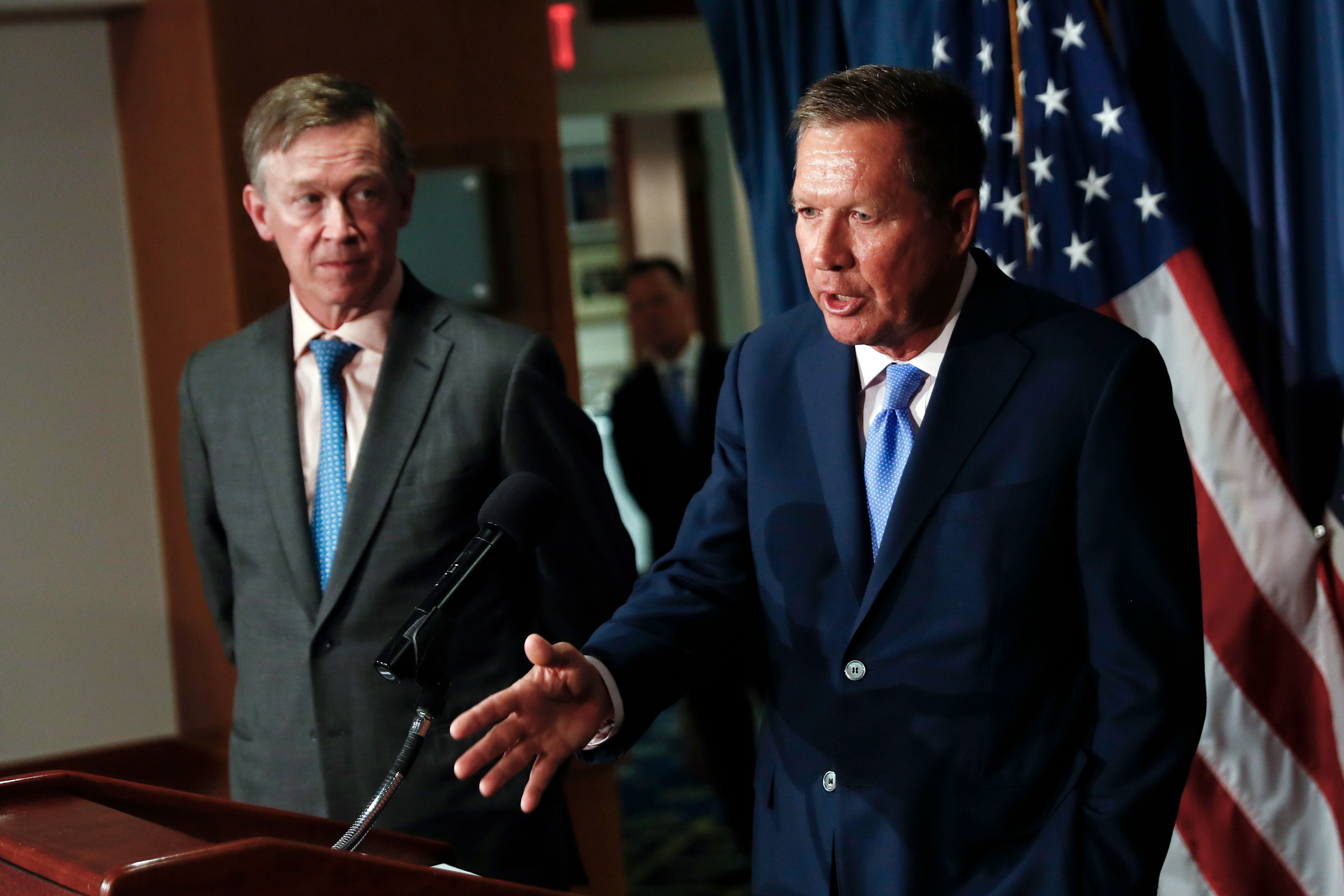

Posted 9:00 a.m. | Updated 3:45 p.m.
Colorado’s Democratic Gov. John Hickenlooper and Ohio Republican Gov. John Kasich released their long-awaited bipartisan plan for health care reform Thursday.
“We're not trying to start a revolution here,” Hickenlooper said at a morning news conference at the Colorado state Capitol. “These are very cautious, pragmatic efforts to maintain the stability of the individual market, which will almost certainly reduce premiums, which will almost certainly expand coverage.”
In a letter to congressional leaders, the two governors set out three recommendations:
Immediate federal assistance to stabilize of health insurance markets. “Congress should continue its work to identify reforms that strengthen insurance markets in the long term, but we need immediate action to ensure consumers have affordable options in the short term.”
The preservation of recent coverage gains and support of cost control. “Governors have been eager to pursue reforms that strengthen health insurance markets in our states, but uncertainty about the ACA and the status of federal subsidies to support the individual market have made it difficult to proceed. Working alongside states, the federal government must make reforms that will preserve and expand gains in coverage, while controlling costs for consumers.”
Federal assistance to help support states’ innovation. “States can pursue many reforms without federal assistance. However, in some cases states are constrained by federal law and regulation from being truly innovative. We urge Congress and federal agencies to work with states to overcome these constraints, focusing first on improving the regulatory environment, supporting state innovation waivers, and controlling costs through payment innovation.”
“Is this going to fix all that is broken within our health care system? No. Clearly that’s not going to happen,” Hickenlooper said at his press conference. “But this is taking a big bite out of a very large problem.”
About 192,000 people in Colorado are covered by Obamacare. Hickenlooper said the most immediate change for Coloradans would be for those who live on the Western Slope, where 14 counties have only one insurance carrier. Earlier this year, Anthem Blue Cross and Blue Shield threatened to pull out altogether -- but didn't.
The governor proposed tax incentives for insurance companies that keep doing business in rural counties. Another option would let people join the health insurance companies that federal workers use.
Cost Relief For Colorado?
Insurance companies have proposed an average hike of 27 percent in Colorado's individual market for next year. Hickenlooper's proposal would extend current federal subsidies that provide health-insurance discounts for low-income people at least through 2019. President Trump has repeatedly threatened to end those subsidies.
Hickenlooper and others argue that Trump's threats create uncertainty for the insurance companies and push the rates up. The Congressional Budget Office says ending those subsidies would raise rates 20 to 25 percent.
The package from Hickenlooper and Kasich would also include a temporary federal fund of $15 billion to back up the states and lower premiums, which could encourage younger and healthier people to buy insurance.
'Nibbles Around Edges'
The nonpartisan Colorado Health Institute said the proposal had "good, pragmatic ideas" that would help stabilize the insurance markets. But in a statement CHI added that the proposal would not be a big fix, and said some of the ideas are untested or unfunded.
"The proposals do little to address the underlying cost drivers in health care, including prescription drugs and hospital care," CHI said.
State Sen. Jim Smallwood, R-Parker, said he was encouraged by parts of the plan. But he said that it didn't try to tackle Medicaid, which accounts for about a third of the state budget and covers a quarter of the state's residents. Smallwood called that omission an "elephant in the room."
"I think we need to be real and say, 'Is this really what we wanted as a state or as a country? Or is there a better solution?" Smallwood said.
The conservative group Americans For Prosperity said the proposal would change very little.
"The bill nibbles around the edges and keeps in place a lot of the devastating policies of Obamacare," said AFP's Jesse Mallory, the group's state director.
Six other governors signed onto the Hickenlooper-Kasich proposal: Brian Sandoval, a Republican from Nevada; Tom Wolf, a Democrat from Pennsylvania; Bill Walker, an independent from Alaska; Terence McAuliffe, a Democrat from Virginia; John Bel Edwards, a Democrat from Louisiana; and Steve Bullock, a Democrat from Montana.
Hickenlooper and Kasich are part of a group of governors set to discuss health care with Congress next week. But any federal action could be difficult given the Republicans' earlier failed effort to repeal the Affordable Care Act and the Trump administration's turn toward tax reform.
The seven-page letter, which you can read below, fleshes out the set of principles the governors wrote about in The Washington Post earlier in the summer.
CPR's Nathaniel Minor and Michelle P. Fulcher reported this story.








